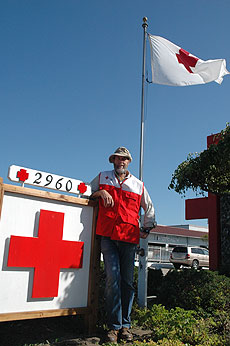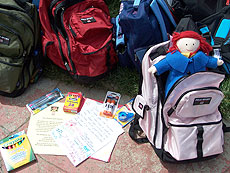September 19, 2005
UCSC staff, students, and faculty contribute to Katrina recovery
By Jennifer McNulty
Campus cook Bruce Holgers was prepared to write a check, but before he knew it, he was on a plane to Louisiana to help feed the survivors of Hurricane Katrina.
|

Bruce Holgers, a senior cook at
Crown-Merrill Dining Hall,
canceled his vacation to help victims of Hurricane Katrina
in Slidell, Louisiana.
Photo: Jennifer McNulty
|

Educational Partnership staff members shipped 89 backpacks
filled with school supplies and other goodies to young hurricane
victims.
Photo: Laurie Scolari |
Holgers had contacted the American Red Cross about making a cash donation, but when officials learned he was a cook, they had a bigger donation in mind. Holgers cancelled his two-week vacation, enrolled in a condensed training course, and flew to Baton Rouge on September 5.
"We were like an ice cream truck, driving around the neighborhoods with corned beef hash," recalled Holgers, a senior cook at the Crown-Merrill Dining Hall. "We offered meals and information, and we listened to stories. We were the mobile food supplier and the mobile hand-holders."
Holgers worked primarily in Slidell, across Lake Pontchartrain from New Orleans. "The flood water had receded, but there were wires down all over the place, and pine trees had just smashed through homes and automobiles," he said. Household appliances and possessions were piled in the streets.
Holgers was struck by the Southern hospitality that greeted him everywhere. "Everyone was extraordinarily grateful--especially when they heard we'd come from California, Michigan, Indiana, Massachusetts," he said. "As a Northerner, I'm not used to being called, 'Sir.' I did not hear one discouraging word."
In addition, relief workers formed tight bonds. "There was the work we did, the misery we saw, and our efforts to alleviate that misery," he said. "And there was the fun and camaraderie we had at the same time--it was like being at camp. It was a saintly collection of people."
On campus, Chancellor Denton established a committee to oversee UCSC's response to the disaster. In Student Affairs, staff are helping students who had planned to attend college in the Gulf Coast region. As of September 14, UCSC had extended offers of admission to 25 students from the devasted area.
Laurie Scolari, associate director of the Educational Partnership Center, was touched by the generosity of her colleagues, who rallied to fill backpacks with school supplies, toys, and other goodies for Katrina victims. Scolari initially purchased 20 knapsacks but ended up shipping 89 loaded backpacks to Baton Rouge, many bearing UCSC t-shirts and slug mascot items purchased by her EPC coworkers.
"I'm always amazed by my EPC colleagues' kind hearts professionally and personally," said Scolari, who worked with Operation Ryan's Hope, a local nonprofit that is shipping supplies to the storm-devastated region.
At the Bay Tree Bookstore, customers may make a donation to the American Red Cross' Katrina relief efforts when they make a purchase.
In the Community Studies Department, field-study coordinator Michael Rotkin is organizing internships for UCSC students who want to work with relief agencies in the hurricane-stricken region. Students will receive academic credit for their contributions and should contact Rotkin at (831) 459-4601 or via e-mail at openup@ucsc.edu for more information.
Faculty have shared their expertise with reporters covering the hurricane and its aftermath, as well. Professor emeritus of psychology Elliot Aronson was quoted in a New York Times story about the breakdown of social order that followed the flooding of New Orleans.
''Our experiments have shown that you can get people to commit immoral acts one step at a time,'' Aronson told the newspaper in an e-mail interview. ''People who would never dream of stealing a TV set might be inclined to do so if they first stole some water, bread, cereal, milk, and so on.''
Reporters with the Los Angeles Times and Sacramento Bee contacted David Wellman, professor of community studies, regarding the ways race emerged as an issue in hurricane response efforts and media coverage of the disaster.
"Many whites will focus on the lawlessness of what's going on in New Orleans," Wellman told the Los Angeles Times. "Many blacks will focus on the desperation of the victims, the fact that they're being neglected and ignored."
Wellman said the nation's racial fault lines operate like geological fault lines: "They're invisible until there's an earthquake," he told the paper.
The theme emerged in Wellman's comments to the Sacramento Bee.
"One of the things these so-called natural disasters do is they make visible things that are normally invisible," he told the Bee. "What is being made visible as a result of the storm is the invisibility and the vulnerability of black Americans."
Finally, politics professor Daniel Wirls helped the San Jose Mercury News sort out the political fallout for President Bush of his handling of the disaster. "All of a sudden, some of their agenda just doesn't seem to fit the reality of what's going on in this country," Wirls said of the Bush administration and its focus on tax breaks, domestic spending cuts, and the war in Iraq.
For additional information on campus efforts, check UCSC's Hurricane Katrina web site.
 Email this story
Email this story
 Printer-friendly version
Printer-friendly version
 Return to Front Page
Return to Front Page